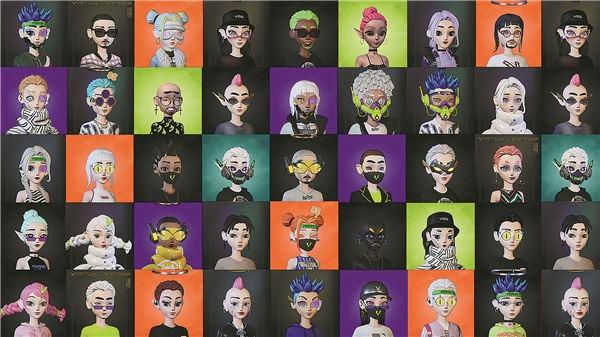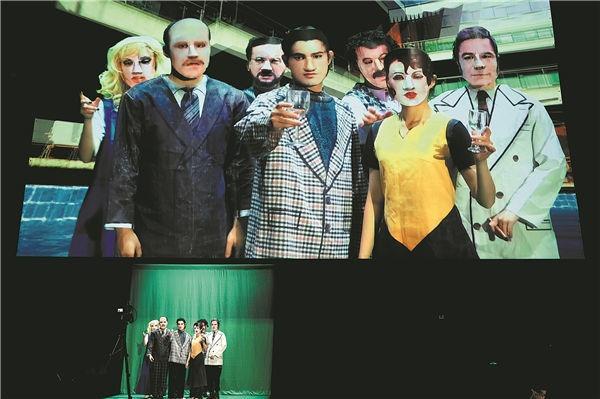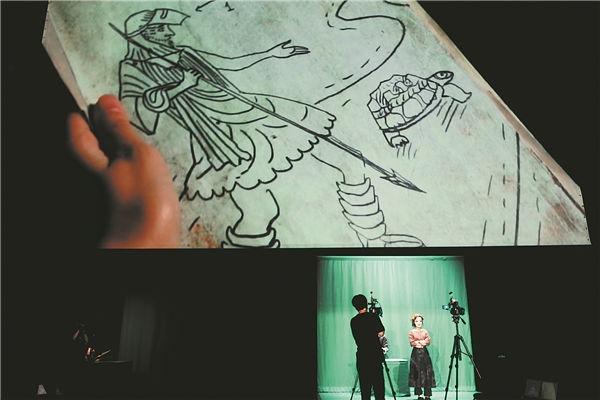 With technology playing a leading role, especially with virtual reality, the first Sphinx Metaverse Theatre Festival will run from April 15 to May 7, featuring 65 theatrical works to be staged both in theaters and online. Audiences will be able to take part through the use of virtual reality headsets, smartphones and computers. (PHOTO PROVIDED TO CHINA DAILY)
With technology playing a leading role, especially with virtual reality, the first Sphinx Metaverse Theatre Festival will run from April 15 to May 7, featuring 65 theatrical works to be staged both in theaters and online. Audiences will be able to take part through the use of virtual reality headsets, smartphones and computers. (PHOTO PROVIDED TO CHINA DAILY)
A new festival aims to use technology to assist performances and set design, Chen Nan reports.
The sphinx, one of the most enduring symbols of Ancient Egypt, is a mythical creature that has intrigued and inspired human imagination for thousands of years.
The symbol of mystery has been used in naming the Sphinx Metaverse Theatre Festival, which will run from April 15 to May 7. Sixty-five theatrical works will be featured in the festival, which will be staged both in theaters in the country and online.
AI-assisted technologies are readily available. I notice there's concern about the prediction that AI would outperform humans. But I believe that technologies may stimulate a civilizational transformation rather than replacing artists, who are independent, creative and irreplaceable.
Chen Yan, Founder and CEO of NG Comic
"We call it 'sphinx' because the festival is all about imagination. It's one of the first of its kind in China, which will combine theater with the latest technology based on the concept of metaverse, which is a shared virtual environment that people access via the internet," says Liu Chang, supervisor of the festival, who is also a theater director.
Technology has increased the capabilities of theater in many ways, from set design to performances. What artists like Liu want to see is "how these new mediums can take the art form to the future".
READ MORE: Humans vs machines: The fight to copyright AI art
Supported by technology, the festival will be held in several Chinese cities, such as Beijing, Shanghai and Guangzhou, as well as cities outside China, such as New York, Paris and Berlin. It will also involve 17 top technology companies that offer support to artists, helping them fulfill their ideas, Liu says, adding that technologies such as artificial intelligence, virtual human hosts and performers will be used.
A Chinese play directed by Meng Jinghui, inspired by the two-part drama Faust by Johann Wolfgang von Goethe, will premiere on Saturday and be staged through April 23 in Beijing, as the opening play of the festival. Faust starts with the devil, Mephistopheles, making a bet with God. He says he can deflect God's favorite human being, Faust, who is striving to learn everything that can be known, away from righteous pursuits. Faust makes a deal with the devil that it will do everything Faust wants while he is on Earth. If during that time, Faust is so pleased with anything the devil gives him that he wants to stay in that moment forever, he will do the devil's bidding in hell.
 With technology playing a leading role, especially with virtual reality, the first Sphinx Metaverse Theatre Festival will run from April 15 to May 7, featuring 65 theatrical works to be staged both in theaters and online. Audiences will be able to take part through the use of virtual reality headsets, smartphones and computers. (PHOTO PROVIDED TO CHINA DAILY)
With technology playing a leading role, especially with virtual reality, the first Sphinx Metaverse Theatre Festival will run from April 15 to May 7, featuring 65 theatrical works to be staged both in theaters and online. Audiences will be able to take part through the use of virtual reality headsets, smartphones and computers. (PHOTO PROVIDED TO CHINA DAILY)
During the first half of the play, Meng introduces the story in a traditional theatrical way by having real audiences sit in his Fengchao Theater in Beijing. The second half of the play will expand the audience base into the internet by having people witness and participate in Faust's deal with the devil online. Audiences can use their cellphones, computers and virtual reality headsets to be part of the play, with real actors and actresses changing into virtual performers.
"There will be about 400 audience members in the theater and more people online, being with us. For Meng, it will be a great challenge and experiment. He is excited, and we have no idea where this play will go when it is premiered," says Liu.
READ MORE: Curtain rises on return of international shows
Liu's theatrical work, inspired by Hieronymus Bosch's painting The Garden of Earthly Delights, will also combine real and virtual scenes. It will be staged from April 30 to May 2 in Aranya, a coastal resort in Qinhuangdao, North China's Hebei province. The play will have the audience explore a "paradise", as the painting depicts, along the beach and small town, supported by AI.
"I try to use the latest technology, such as ChatGPT, to write the script, and I am still working on it since the logic of the large language model is very hard to understand, which is also the interesting part of the working process," says Liu, adding that the stage design is done by AI, which is like a "digital assistant realizing the ideas of Liu and his team".
 Director Li Jianjun's play, "World on a Wire", which is adapted from the movie of the same title by German filmmaker Rainer Werner Fassbinder, will be staged during the upcoming Sphinx Metaverse Theatre Festival. It explores the relationship between the virtual world and reality, as well as that between people and computers. (PHOTO PROVIDED TO CHINA DAILY)
Director Li Jianjun's play, "World on a Wire", which is adapted from the movie of the same title by German filmmaker Rainer Werner Fassbinder, will be staged during the upcoming Sphinx Metaverse Theatre Festival. It explores the relationship between the virtual world and reality, as well as that between people and computers. (PHOTO PROVIDED TO CHINA DAILY)
"I am very intrigued by the relationship between people and the latest technology, especially when combined in theater — a place to dream," Liu says.
Actress Huang Xiangli's monodrama, adapted from Austrian writer Stefan Zweig's novella Letter from an Unknown Woman, has celebrated its 10th anniversary since its premiere. She will give a new rendition of the play by working with a VR company in an art gallery in Beijing's 798 Art Zone from May 3 to 5, which will be combined with artworks such as installations.
 Director Li Jianjun's play, "World on a Wire", which is adapted from the movie of the same title by German filmmaker Rainer Werner Fassbinder, will be staged during the upcoming Sphinx Metaverse Theatre Festival. It explores the relationship between the virtual world and reality, as well as that between people and computers. (PHOTO PROVIDED TO CHINA DAILY)
Director Li Jianjun's play, "World on a Wire", which is adapted from the movie of the same title by German filmmaker Rainer Werner Fassbinder, will be staged during the upcoming Sphinx Metaverse Theatre Festival. It explores the relationship between the virtual world and reality, as well as that between people and computers. (PHOTO PROVIDED TO CHINA DAILY)
The festival will also see collaborations of international talent. For example, artists from Hangzhou, Zhejiang province, Amsterdam and Portland, will give an hourlong performance by American stage director Peter Sellars. German dramatist Sebastian Kaiser will work with over 30 artists from China and Europe in a performance, titled Artistic Intelligence Network, exploring the new format of theater.
ALSO READ: Musical festival showing foreign, Chinese productions
"We want to use technology to augment traditional theater, which involves lots of visuals, interaction and communication," says Chen Yan, founder and CEO of NG Comic, a Beijing-headquartered company that's working with artists for the festival by offering "virtual human products" to engage in theatrical works.
"AI-assisted technologies are readily available. I notice there's concern about the prediction that AI would outperform humans. But I believe that technologies may stimulate a civilizational transformation rather than replacing artists, who are independent, creative and irreplaceable," says Chen.
Contact the writer at chennan@chinadaily.com.cn


